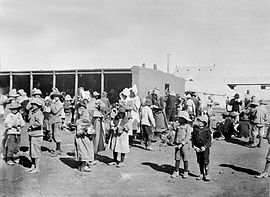Concentration Camps
Hitler’s brutal, often deadly prisons for Jews and others he considered undesirable – There were labor camps where prisoners were worked to death, and death camps, where prisoners were murdered in massive gas chambers and then burned in crematoriums
Internment is the imprisonment of people, commonly in large groups, without charges or intent to file charges. The term is especially used for the confinement "of enemy citizens in wartime or of terrorism suspects". Thus, while it can simply mean imprisonment, it tends to refer to preventive confinement rather than confinement after having been convicted of some crime. Use of these terms is subject to debate and political sensitivities. The word internment is also occasionally used to describe a neutral country's practice of detaining belligerent armed forces and equipment on its territory during times of war, under the Hague Convention of 1907.

Interned persons may be held in prisons or in facilities known as internment camps, some of which are known as concentration camps. The term concentration camp originates from the Spanish–Cuban Ten Years' War when Spanish forces detained Cuban civilians in camps in order to more easily combat guerrilla forces. Over the following decades the British during the Second Boer War and the Americans during the Philippine–American War also used concentration camps.
The terms concentration camp and internment camp are used to refer to a variety of systems that greatly differ in their severity, mortality rate, and architecture; their defining characteristic is that inmates are held outside the rule of law. Extermination camps or death camps, whose primary purpose is killing, are also imprecisely referred to as concentration camps.
The Universal Declaration of Human Rights restricts the use of internment, with Article 9 stating, "No one shall be subjected to arbitrary arrest, detention or exile."

